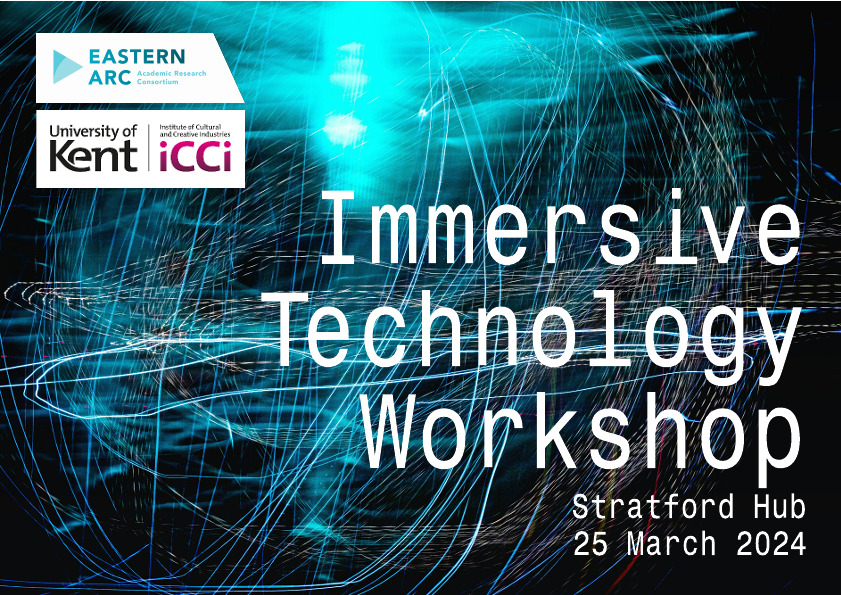Take part in our immersive technology workshop
19 February 2024

Registration is now open to participate in an immersive technologies workshop at Stratford Hub on Monday 25 March 2024 between 09:30-16:00.
The workshop is free and open to anyone at one of the four EARC universities (UEA, Essex, Kent, Sussex) with an interest and engagement in immersive technologies for research or teaching.
It will be an opportunity to hear about the national strategic picture (with a presentation from the AHRC), to understand the facilities and strengths across the Arc, and explore how we can work togther for mutual benefit.
To apply, please fill in this form by Monday 18 March at 12:00.
Background
The Government is prioritising new technologies – including AI and XR – to address key economic and social drivers. This is clear in a range of recent strategies and funder priorities.
The fifth objective in UKRI’s Strategy focuses on world-class impacts, including ‘harness[ing] the opportunities from tomorrow’s technologies’ (5.2). This leads through to AHRC’s intention to ‘extend the success of research and innovation-driven creative industries into new sectors, partnership and places,’ EPSRC’s ‘Digital Futures’ mission, and the ‘AI, Digital and Advanced Computing’ technology family of the Innovation Strategy.
The Eastern Arc universities are well positioned to benefit from this. Their centres and facilities include:
- Kent’s Institute for Cultural and Creative Industries, which has secured £15m to develop state-of-the-art digital production studios (called Docking Station) including LED volume, motion capture, volumetric capture and photogrammetry;
- The Sussex Humanities Lab (SHL), an interdisciplinary Centre of Excellence that investigates the interactions between computational technology, culture, society and environment;
- Essex’s School of Computer Science, Electronics and Engineering (CSEE), which has a strategic focus on Robotics and Embedded Systems, Brain Computer Interfaces and Neural Engineering;
- CreativeUEA, which enables and facilitates interactions across and beyond the University in using tomorrow’s technologies creatively and productively.
All four universities sit within a region where there is a strong need for future-facing skills training (particularly in its coastal communities), but also where there is a strong cultural and creative sector.
 Purpose
Purpose
This facilitated workshop seeks to identify clusters of interdisciplinary strength and will develop partnerships within them. By doing so we will:
- be ready for future funding calls, able to quickly develop strong, compelling and viable proposals.
- be able to share knowledge, training and resources for both staff and students across a range of areas, within and beyond computer science and the cultural and creative disciplines.
- be well-positioned to work with businesses to develop commercial opportunities.
Participants
There will be a limit of 40 spaces. Colleagues from all disciplines at the four Eastern Arc universities (UEA, Essex, Kent and Sussex) are welcome, and the organisers are keen to welcome those in a broad range of disciplines who see the potential to use the technology in their research and teaching, including (but not limited to) medicine, psychology, conservation, archaeology, history, heritage, computing/digital design and sports and exercise sciences.
Format
The format is to be finalised, but will broadly be as follows:
- Demonstration: we hope that some immersive technology will be demonstrated and available for participants to try.
- Provocation: what is the direction of travel for government policy and funder strategy in this area?
- Are there key themes that will be prioritised?
- Overview: an overview of the current strengths at each university.
- Discussion: a facilitated workshopping session to discuss how these strengths can map on to the themes.
Outcome
By the end of the workshop we aim to have identified a small number of areas of clear strength that are shared across Eastern Arc, which map onto government and funder priorities and give scope for creative development. These will be developed further through collaborations (visits, exchanges, workshops, projects, training) after the workshop.
